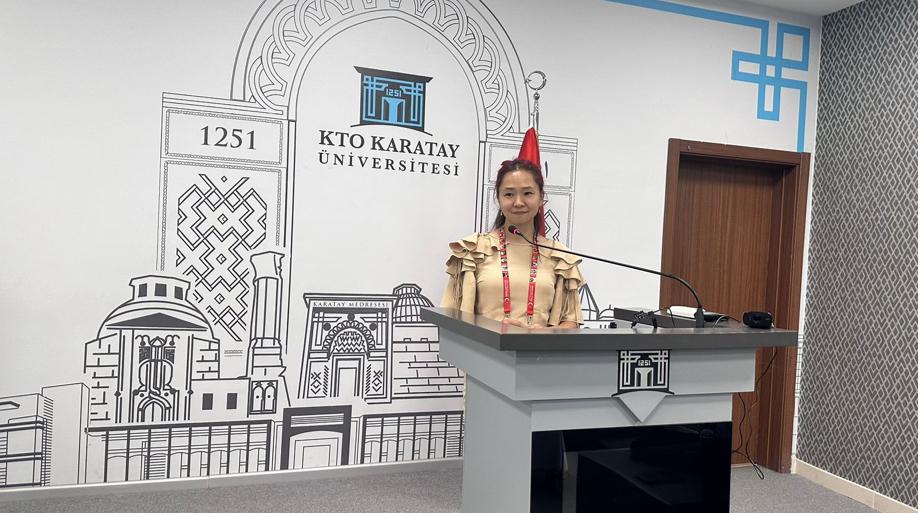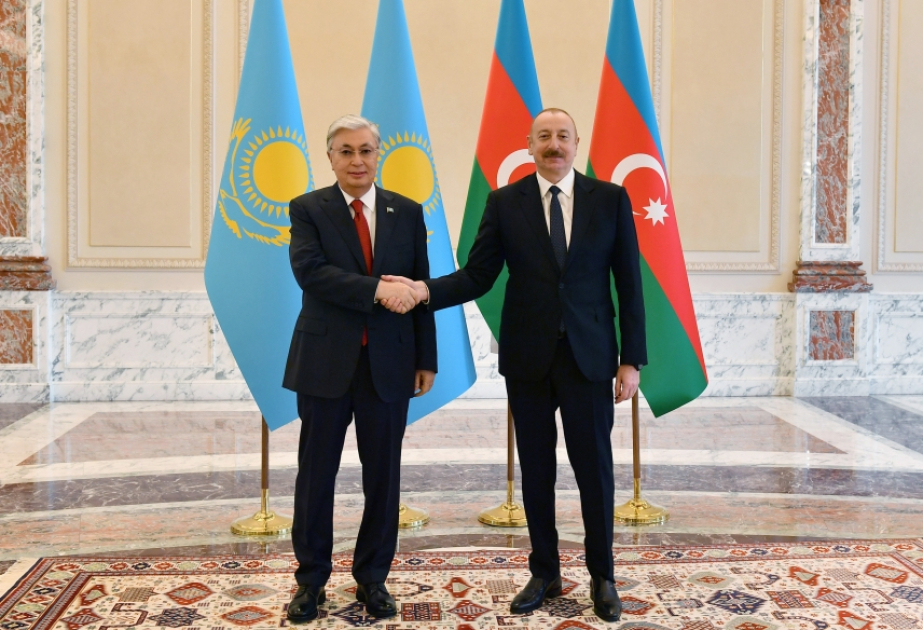BAKU, Azerbaijan, October 20. The upcoming state visit of Azerbaijani President Ilham Aliyev to Kazakhstan is expected to provide a fresh impetus for strengthening and diversifying economic cooperation between the two countries, Kazakh political analyst Aigerim Zhampehtova told Trend.
“Following the visit, we can anticipate expanded collaboration across transport and logistics, energy, industry, and agro-industrial sectors. Kazakhstan and Azerbaijan are already actively working on the development of the Middle Corridor, focusing on increasing its capacity, modernizing port and railway infrastructure, and establishing joint logistics operators to overcome existing barriers and improve route efficiency,” Zhampehtova said.
She highlighted the significant potential in energy, including green technologies and renewable energy projects, while noting that the agro-industrial sector offers opportunities to increase agricultural product deliveries. This year, Kazakhstan became the main grain supplier to the Azerbaijani market, accounting for around 85 percent of total imports. Cooperation in digitalization is also expanding, including the creation of joint platforms for e-services and e-commerce.
 “Modern relations between
Kazakhstan and Azerbaijan can be characterized as a stable
strategic partnership built on longstanding friendship and mutual
trust. Shared historical roots, language, religion, and values
provide a natural foundation for cooperation. Diplomatic relations
were established in August 1992 and have developed dynamically
since then,” Zhampehtova added.
“Modern relations between
Kazakhstan and Azerbaijan can be characterized as a stable
strategic partnership built on longstanding friendship and mutual
trust. Shared historical roots, language, religion, and values
provide a natural foundation for cooperation. Diplomatic relations
were established in August 1992 and have developed dynamically
since then,” Zhampehtova added.
She noted key milestones, including the Declaration on Friendly Relations and Strategic Partnership signed in Astana in 2004 and the Strategic Partnership and Alliance Agreement signed in Baku in 2005. Today, cooperation spans politics, economy, transport, logistics, investment, and cultural-humanitarian exchanges. Coordination within international organizations and regional initiatives, including the Organization of Turkic States (OTS) and the International Trans-Caspian Transport Route, remains central.
The analyst emphasized that trade and economic cooperation have significantly strengthened in recent years, particularly in transport and logistics.
"Both countries coordinate efforts to develop the Middle Corridor, modernizing the ports of Aktau, Kuryk, and Baku, and establishing joint logistics operators. Energy collaboration is also advancing, including the transit of Kazakh oil through Azerbaijani infrastructure, such as the Baku–Tbilisi–Ceyhan pipeline," the expert added.
Industrial and investment cooperation is growing, alongside active cultural exchanges. In 2023, Kazakhstan’s culture days were held in Azerbaijan, and in 2024, Azerbaijan’s culture days took place in Kazakhstan, reinforcing a comprehensive and long-term partnership.
“The Middle Corridor’s potential is increasing amid global logistics route restructuring. This transport route, spanning Kazakhstan, the Caspian Sea, Azerbaijan, Georgia, Türkiye, and Europe, is becoming a sought-after alternative to northern routes. Modernized infrastructure and new logistics centers are positioning the corridor as a key transit link between Asia and Europe,” Zhampehtova said.
She also highlighted the strategic importance of the Zangezur Corridor, which enhances efficiency and capacity along the Middle Corridor, offering Kazakhstan new export opportunities and a robust foundation for regional integration.
The expert added that Kazakhstan and Azerbaijan serve as strategic centers for the development of the Middle Corridor. Thanks to their favorable geographic locations and infrastructure investments, both countries have become key players in forming a new Eurasian transport route connecting European and Asian markets.
She recalled that in 2022, Kazakhstan, Azerbaijan, Georgia, and Türkiye signed a "Roadmap for 2022–2027" in Aktau for the development and operation of the Middle Corridor. The document outlines coordinated actions to modernize infrastructure, remove logistical bottlenecks, and improve customs procedures.
“In 2024, the parties agreed to update the roadmap, emphasizing the acceleration of project implementation. According to plans, the route’s capacity should increase to ten million tons. These steps aim to make the Middle Corridor a sustainable and competitive alternative to northern and southern transport routes. With developed port capacities and modern logistics centers, Kazakhstan and Azerbaijan act as key drivers of this process,” she said.
Zhampehtova also highlighted the importance of the Zangezur Corridor for Kazakhstan, as it enhances the efficiency and capacity of the entire Middle Corridor.
“Its implementation can significantly shorten transport routes and strengthen logistical connections among Turkic states, making transport flows faster and more economical. For Kazakhstan, this opens new export opportunities and creates a solid infrastructure foundation for regional integration,” she said.
She noted that in the long term, the project has the potential to give new momentum to trade, investment, and economic cooperation, strengthening a unified Eurasian transport space.
The political analyst also said that the partnership between Astana and Baku within the Organization of Turkic States (OTS) plays a key role in strengthening both bilateral and multilateral ties. Kazakhstan and Azerbaijan actively cooperate across all major areas of the OTS agenda, which today covers over 30 areas, from economy and transport to digitalization, energy, education, and culture.
“Participation in structures such as TURKSOY, TurkPA, and the Turkic Culture and Heritage Foundation helps deepen humanitarian ties and strengthen shared cultural foundations. Both countries maintain a coordinated agenda within the OTS and seek to further strengthen political dialogue, expand economic ties, and promote joint initiatives aimed at sustainable development across the Turkic space,” she said.
Zhampehtova emphasized that the Kazakhstan-Azerbaijan Business Forum will serve as another step to activate trade and economic relations.
“Such meetings have been held before and follow a systematic approach, reflecting the consistent development of economic dialogue between Kazakhstan and Azerbaijan. The forum creates new opportunities to deepen investment and trade cooperation and establish direct contacts between business circles in both countries. Discussions are likely to include the agro-industrial sector and agriculture, which have significant potential for joint projects, technology exchange, and trade expansion. The business forum not only strengthens bilateral economic ties but also contributes to the further development of collaboration on a sustainable and practical basis,” she concluded.
Stay up-to-date with more news on Trend News Agency's WhatsApp channel







